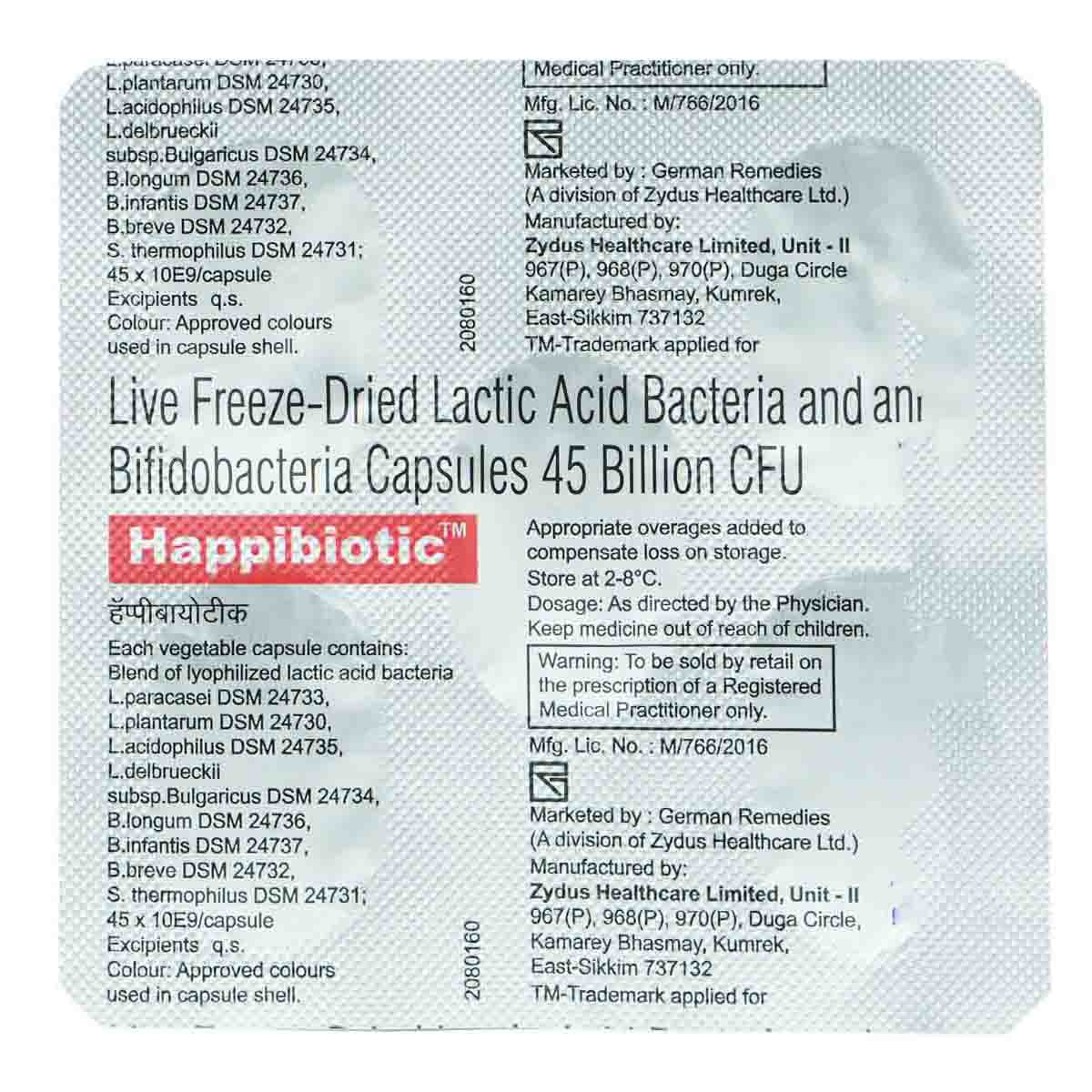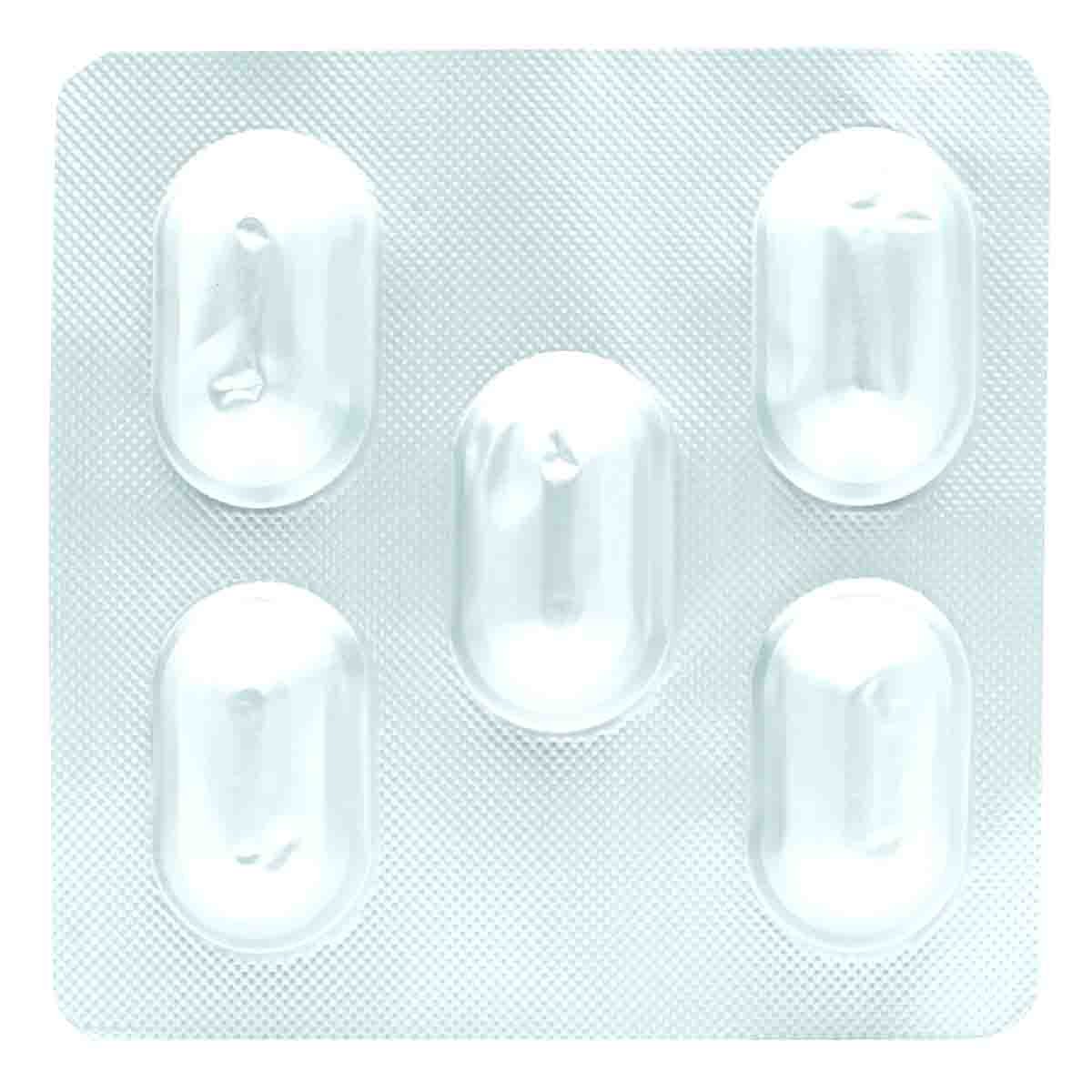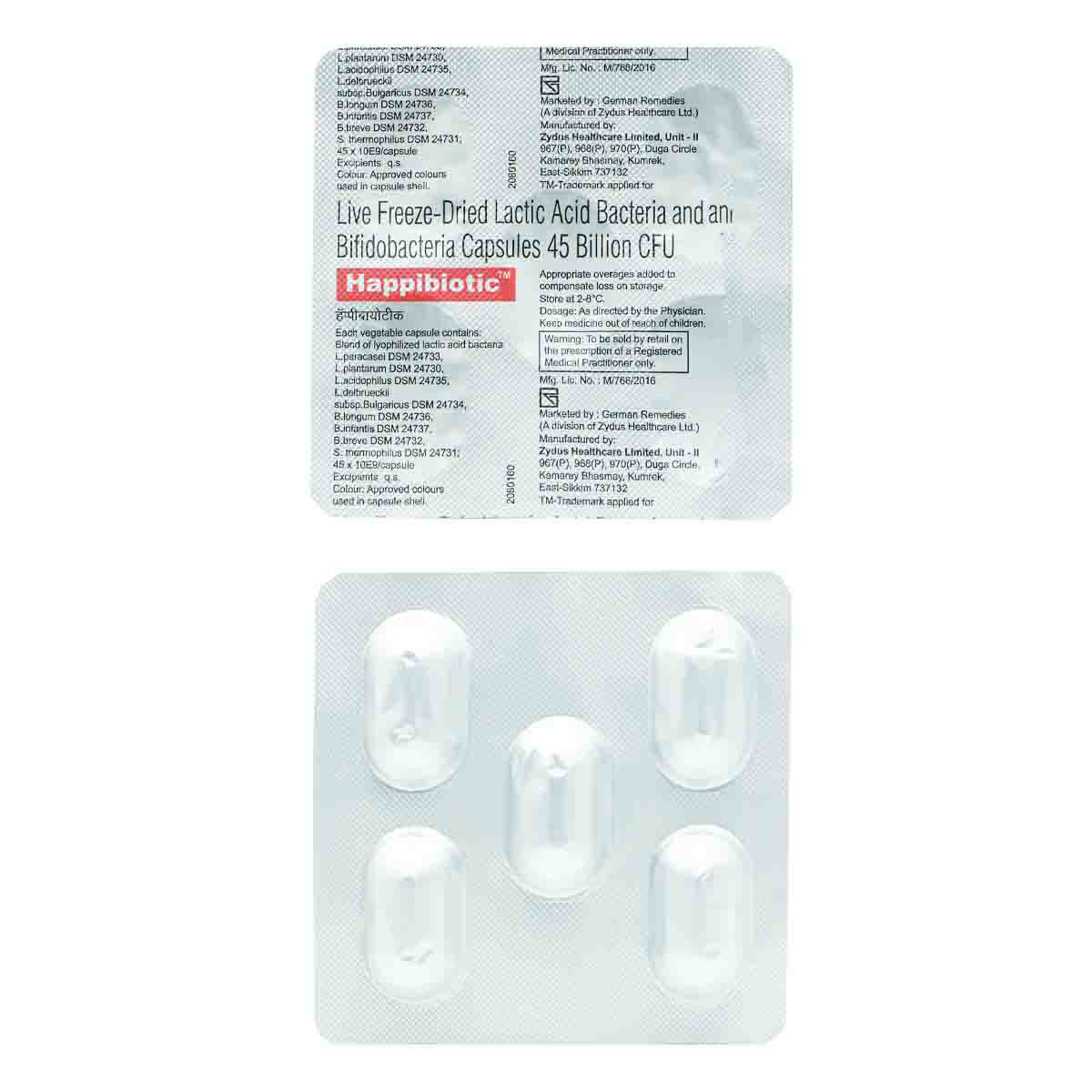Happibiotic Capsule 5's
MRP ₹141
(Inclusive of all Taxes)
₹14.1 Cashback (10%)
About Happibiotic Capsule
Happibiotic Capsule belongs to the group of medicines called probiotics used to treat and prevent ulcerative colitis and irritable bowel syndrome. An irritable bowel syndrome is a group of intestinal symptoms that occur together. Ulcerative colitis is the inflammation of the gastrointestinal tract. Happibiotic Capsule promotes the health of the intestine, balances the gut flora, increases gut immunity, and supports a balanced inflammatory response.
Happibiotic Capsule contains live freeze-dried lactic acid bacteria and bifidobacteria. These stick against the inner layer of the digestive tract and form a barrier. They modify the gut microbiota and protect against harmful bacteria and toxins substances by interfering with their attachment. Lactic acid bacteria creates an acidic environment that is unfavourable for pathogen growth. Thereby, Happibiotic Capsule helps treat irritable bowel disease and ulcerative colitis.
You are advised to take Happibiotic Capsule for as long as your doctor has prescribed it for you, depending on your medical condition. Happibiotic Capsule is generally safe and does not cause any side effects. However, sometimes, it may cause gas, bloating, and abdominal discomfort. Most of these side effects do not require medical attention and will resolve gradually over time. You are advised to talk to your doctor if you experience these side effects persistently.
Let your doctor know if you are taking prescription, non-prescription drugs, or herbal products before starting Happibiotic Capsule. If you are known to be allergic to any of the components in Happibiotic Capsule, please inform your doctor. Consult your doctor before taking Happibiotic Capsule if you are pregnant or breastfeeding. Happibiotic Capsule should be given to children only if prescribed by a doctor.
Country of origin
Manufacturer/Marketer address
Online payment accepted

secured payment

india's most trusted pharmacy

genuine products
Manufacturer/Marketer :
Consume Type :
Expires on or after :
Return Policy :
Provide Delivery Location
About Happibiotic Capsule
Happibiotic Capsule belongs to the group of medicines called probiotics used to treat and prevent ulcerative colitis and irritable bowel syndrome. An irritable bowel syndrome is a group of intestinal symptoms that occur together. Ulcerative colitis is the inflammation of the gastrointestinal tract. Happibiotic Capsule promotes the health of the intestine, balances the gut flora, increases gut immunity, and supports a balanced inflammatory response.
Happibiotic Capsule contains live freeze-dried lactic acid bacteria and bifidobacteria. These stick against the inner layer of the digestive tract and form a barrier. They modify the gut microbiota and protect against harmful bacteria and toxins substances by interfering with their attachment. Lactic acid bacteria creates an acidic environment that is unfavourable for pathogen growth. Thereby, Happibiotic Capsule helps treat irritable bowel disease and ulcerative colitis.
You are advised to take Happibiotic Capsule for as long as your doctor has prescribed it for you, depending on your medical condition. Happibiotic Capsule is generally safe and does not cause any side effects. However, sometimes, it may cause gas, bloating, and abdominal discomfort. Most of these side effects do not require medical attention and will resolve gradually over time. You are advised to talk to your doctor if you experience these side effects persistently.
Let your doctor know if you are taking prescription, non-prescription drugs, or herbal products before starting Happibiotic Capsule. If you are known to be allergic to any of the components in Happibiotic Capsule, please inform your doctor. Consult your doctor before taking Happibiotic Capsule if you are pregnant or breastfeeding. Happibiotic Capsule should be given to children only if prescribed by a doctor.
Uses of Happibiotic Capsule
Key Benefits
Happibiotic Capsule belongs to the group of medicines called probiotics used to treat ulcerative colitis and irritable bowel syndrome. Happibiotic Capsule contains live freeze-dried lactic acid bacteria and bifidobacteria. These stick against the inner layer of the digestive tract and form a barrier. They modify the gut microbiota and protect against harmful bacteria and toxins substances that might upset the digestive tract. Thereby, helps treat irritable bowel disease and ulcerative colitis. Happibiotic Capsule promotes the health of the intestine, balances the gut flora, increases gut immunity, and supports a balanced inflammatory response.
Directions for Use
Storage
Side Effects of Happibiotic Capsule
- Gas
- Bloating
- Abdominal discomfort
Drug Warnings
Do not take Happibiotic Capsule if you are allergic to any of the components. Consult your doctor if you are pregnant or breastfeeding. Happibiotic Capsule should be given to children only if prescribed by the doctor. Keep your doctor informed about your health condition and the medicines you are taking to rule out any interactions.
Drug Interactions
Drug-Drug Interactions: No interactions found/established.
Drug-Food Interactions: No interactions found/established.
Drug-Disease Interactions: No interactions found/established.
Habit Forming
Diet & Lifestyle Advise
- Eat smaller meals more often.
- Avoid smoking and alcohol consumption. Alcohol intake leads to increased production of stomach acid, thereby increasing acidity and heartburn.
- Maintain a healthy weight by regular exercising.
- Avoid carbonated and caffeinated beverages.
- Practise relaxation techniques and avoid stress by doing yoga or meditation.
- Avoid high-fat food, spicy food, chocolates, citrus fruits, pineapple, tomato, onion, garlic, tea and soda.
- Avoid deep-fried and spicy foods.
- Foods containing probiotics may help in providing relief from gas and bloating.
Disease/Condition Glossary
Irritable bowel syndrome (IBS): IBS is also known as irritable colon, spastic colon, spastic colitis, and mucous colitis. It is a common disease that affects the large intestine. An irritable bowel syndrome is a group of intestinal symptoms that occur together. The exact cause is unknown, but common causes of IBS are acidity, stress, carbonated foods and beverages, irregular hormone levels, certain food and medications. Symptoms include abdominal pain, cramps, bloating, gas, constipation, and/or diarrhoea.
Ulcerative colitis: It is a type of chronic inflammatory bowel disease that causes inflammation of the lining of the large intestine (colon) and produces ulcers on the lining of the colon, which may cause bleeding and discharge of pus and mucus. The common symptoms include bloody stools, stomach pain, rectal pain, diarrhoea, fever, and weight loss. Additionally, it may cause other problems such as joint pain or swelling, mouth sores, skin problems, decreased appetite or nausea.
FAQs
Happibiotic Capsule contains probiotics that stick against the inner layer of the digestive tract and form a barrier. They modify the gut microbiota and protect against harmful bacteria and toxins substances that might upset the digestive tract. Thereby, Happibiotic Capsule helps treat irritable bowel disease and ulcerative colitis.
Happibiotic Capsule helps the growth of friendly bacteria and maintains the balance of microflora in the intestinal environment. It helps support levels of healthy microflora, thereby improves gastrointestinal ecology.
To treat your condition effectually, continue taking Happibiotic Capsule for as long as your doctor has advised. Do not be reluctant to speak with your doctor if you experience any difficulty while taking Happibiotic Capsule.
Happibiotic Capsule can be taken with antibiotics if prescribed by the doctor. However, you are advised to maintain a gap of 2 hours between Happibiotic Capsule and antibiotics as taking them together might affect the effectiveness of Happibiotic Capsule.
Disclaimer
Keep Refrigerated. Do not freeze.Prepaid payment required.
Alcohol
Safe if prescribed
It is not known if alcohol interacts with Happibiotic Capsule, so please consult a doctor if you have any concerns.
Pregnancy
Consult your doctor
Please consult your doctor if you have any concerns regarding this; your doctor will decide whether pregnant women can take Happibiotic Capsule or not.
Breast Feeding
Consult your doctor
Please consult your doctor if you have any concerns regarding this; your doctor will decide whether Happibiotic Capsule can be taken by breastfeeding mothers or not.
Driving
Safe if prescribed
Happibiotic Capsule is unlikely to affect your ability to drive. However, drive or operate machinery only if you are alert.
Liver
Consult your doctor
Please consult your doctor if you have a liver impairment or any concerns regarding this.
Kidney
Consult your doctor
Please consult your doctor if you have kidney impairment or any concerns regarding this.
Children
Safe if prescribed
Happibiotic Capsule should be given to children only if prescribed by the doctor.
Author Details
We provide you with authentic, trustworthy and relevant information
Uses of Happibiotic Capsule
Key Benefits
Happibiotic Capsule belongs to the group of medicines called probiotics used to treat ulcerative colitis and irritable bowel syndrome. Happibiotic Capsule contains live freeze-dried lactic acid bacteria and bifidobacteria. These stick against the inner layer of the digestive tract and form a barrier. They modify the gut microbiota and protect against harmful bacteria and toxins substances that might upset the digestive tract. Thereby, helps treat irritable bowel disease and ulcerative colitis. Happibiotic Capsule promotes the health of the intestine, balances the gut flora, increases gut immunity, and supports a balanced inflammatory response.
Directions for Use
Storage
Drug Warnings
Do not take Happibiotic Capsule if you are allergic to any of the components. Consult your doctor if you are pregnant or breastfeeding. Happibiotic Capsule should be given to children only if prescribed by the doctor. Keep your doctor informed about your health condition and the medicines you are taking to rule out any interactions.
Therapeutic Class
Drug-Drug Interactions
Drug-Drug Interactions
Login/Sign Up
Diet & Lifestyle Advise
- Eat smaller meals more often.
- Avoid smoking and alcohol consumption. Alcohol intake leads to increased production of stomach acid, thereby increasing acidity and heartburn.
- Maintain a healthy weight by regular exercising.
- Avoid carbonated and caffeinated beverages.
- Practise relaxation techniques and avoid stress by doing yoga or meditation.
- Avoid high-fat food, spicy food, chocolates, citrus fruits, pineapple, tomato, onion, garlic, tea and soda.
- Avoid deep-fried and spicy foods.
- Foods containing probiotics may help in providing relief from gas and bloating.
Habit Forming
Side Effects of Happibiotic Capsule
- Gas
- Bloating
- Abdominal discomfort
Disease/Condition Glossary
Irritable bowel syndrome (IBS): IBS is also known as irritable colon, spastic colon, spastic colitis, and mucous colitis. It is a common disease that affects the large intestine. An irritable bowel syndrome is a group of intestinal symptoms that occur together. The exact cause is unknown, but common causes of IBS are acidity, stress, carbonated foods and beverages, irregular hormone levels, certain food and medications. Symptoms include abdominal pain, cramps, bloating, gas, constipation, and/or diarrhoea.
Ulcerative colitis: It is a type of chronic inflammatory bowel disease that causes inflammation of the lining of the large intestine (colon) and produces ulcers on the lining of the colon, which may cause bleeding and discharge of pus and mucus. The common symptoms include bloody stools, stomach pain, rectal pain, diarrhoea, fever, and weight loss. Additionally, it may cause other problems such as joint pain or swelling, mouth sores, skin problems, decreased appetite or nausea.
All Substitutes & Brand Comparisons

Have a query?

















_0.jpg?tr=q-85)



